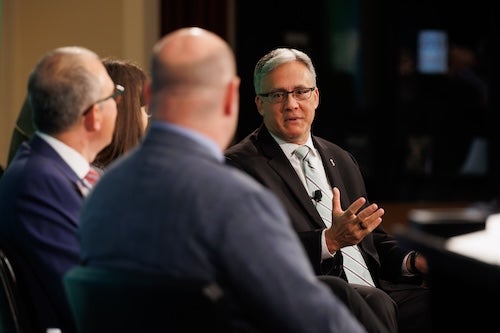Energy leaders from academia and industry convened at the eighth annual Energy Summit, hosted by Baker Botts and the Center for Energy Studies at Rice University's Baker Institute. This two-day event united experts to explore the future of the global energy landscape, fostering vital discussions and innovative solutions.
Ken Medlock, senior director of the Center for Energy Studie, opened the summit by highlighting the importance of understanding past energy systems to guide future transitions. “As we look forward to what the future of energy looks like, we have to first understand what the past looks like, because the past actually carries some very important clues regarding what works and what doesn’t.”
Leaders from Air Liquide, AWS, BP, Cheniere, CenterPoint Energy, EDP Renewables, EnCap Investments, ERCOT, ExxonMobil, GTI, Neste, Quantum Capital, Shell, Sempra Infrastructure, SLB, Sunnova and more gathered at the summit. They discussed a wide range of topics, including energy investments, resource challenges and U.S. foreign policy. Medlock led two insightful fireside chats with industry leaders — one with Carolyn Comer, president of Shell Energy North America, and another with Jason Ryan, executive vice president of regulatory services and government affairs at CenterPoint Energy.
The event featured domestic and international perspectives from Latin America, the Middle East and Eurasia. Henry Haggard, nonresident fellow at the Center for Energy Studies, moderated a panel led by the Baker Institute’s Gabriel Collins, the Baker Botts Fellow in Energy and Environmental Regulatory Affairs; Jim Krane, the Wallace S. Wilson Fellow for Energy Studies and co-director of the Middle East Energy Roundtable; and Francisco Monaldi, fellow in Latin American energy policy and director of the Latin America Energy Program. They covered topics like resource availability, the role of oil and gas in the energy transition and the evolving importance of energy investments.

A major focus of the event was the need for energy supply chains to adapt to rising global demand, particularly in developing countries.
“Economic development in less-developed countries is going to bring with it a new demand for energy that we have not seen,” Medlock said. “And of course, that will open all sorts of opportunities to develop supply chains in new and innovative ways that ultimately will allow that energy to be delivered in a reliable, secure, affordable way — but also, hopefully, in a cleaner way.”
Michelle Michot Foss, fellow in energy, minerals and materials at the Baker Institute, moderated a panel discussion on the importance of critical minerals and materials. The panel featured experts from Baker Botts, Dexmat, ENGIE North America, GEOLITH and SLB. Foss emphasized that the future of energy is contingent on the future of materials and that the U.S. has fallen behind on the value chains of these essential resources.
Mark Finley, fellow in energy and global oil at the Baker Institute, moderated a panel that discussed the role of oil as the world transitions to cleaner forms of energy. The panel featured leaders from Coterra, Halliburton Labs, Phillips 66 and S&P Global. The panelists noted that oil is all around us and is used in many downstream products such as plastics, asphalt, rubber, cosmetics, lubricants and detergents in addition to its energy-specific uses.
Finley noted that oil is likely to remain the leading fuel source for the U.S. economy for the foreseeable future, even as governments look for cleaner alternatives. “Today, the United States produces more oil than any country in the history of the planet,” Finley said. “Not only has the U.S. become self-sufficient, we’ve become a significant exporter of both crude oil and refined products into the global marketplace, feeding the rising demand in the Global South and helping our allies grapple with geopolitically driven supply disruptions, but at the same time driving CO2 emissions and other greenhouse gasses.”
Ed Emmett, fellow in energy and transportation policy at the Baker Institute, moderated a panel with First Ammonia, Hoctant and Neste on the future of transportation fuels. The panel left attendees questioning which fuels will lead the way in the energy transition. Emmett highlighted that for the first time, we may see various modes of transportation adopting different fueling options as the industry evolves.
Sustainability was also a key theme throughout the panel discussions on the future of energy. Rachel Meidl, fellow in energy and sustainability at the Baker Institute, led a panel featuring experts from the University of Texas MD Anderson Cancer Center and Waste Management. They explored topics such as medical plastic waste, recycling and the importance of developing circular and sustainable solutions to address plastic waste.
Rice President Reginald DesRoches made a surprise appearance to share his vision on the importance of deep research at the Baker Institute and other Rice programs, and the need to bring people together for meaningful conversations about the future of energy.
“This summit’s theme of exploring the multifaceted nature of energy transitions underscores a critical task of transforming our energy systems in ways that are economically viable, environmentally sustainable and socially equitable,” he said. “Rice University is proud to play a pivotal role in convening such conversations as an institution at the forefront of research and innovation and education. We recognize the importance of addressing not only the technical aspects of energy transitions but also the policy, economic and societal dimensions.”
Learn more about the Baker Institute’s energy research here and Rice’s sustainability efforts here. The Baker Institute’s recently released Energy Insights 2024 also provides a view of the research by the fellows of the Center for Energy Studies and assesses developments in energy markets to illuminate paths forward for policymakers and industry leaders.

